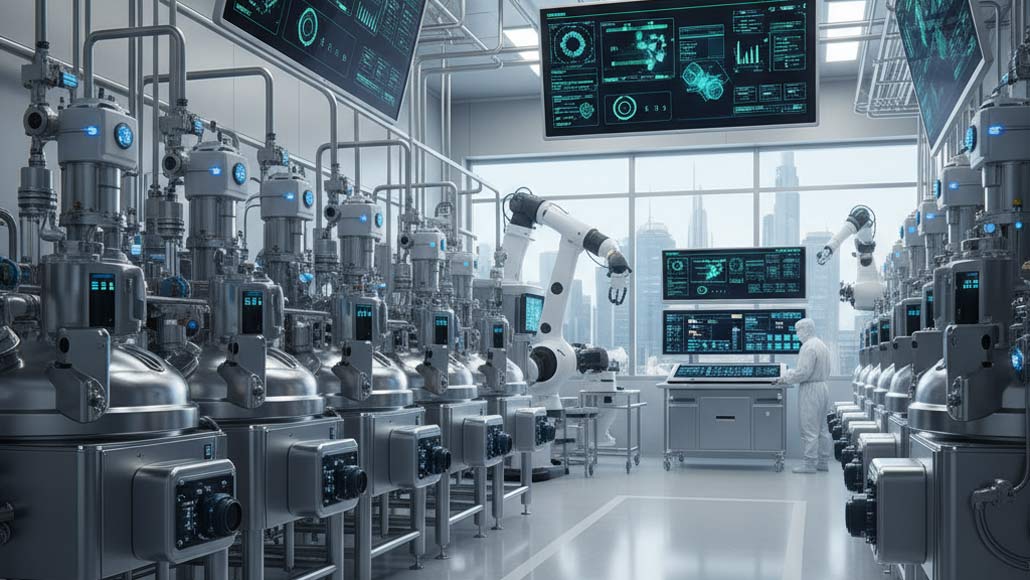Science
Biopharma Revolutionizes Manufacturing with Smart Control Systems

The biopharmaceutical industry is experiencing a significant transformation as manufacturers adopt advanced process control technologies. With a marked increase in global demand for biologics and personalized medicine, companies are under pressure to enhance production efficiency while ensuring patient safety through rigorous quality standards. The integration of smart pumps, valves, and sensors is at the forefront of this technological evolution, optimizing all facets of biopharmaceutical manufacturing.
The Shift to Automation in Biopharma
Historically, biopharma process control depended heavily on human oversight, where operators adjusted parameters manually based on periodic measurements. This traditional method, while functional, led to variability and challenges in maintaining consistent process conditions across extended production runs. Today’s automated systems embody a shift in manufacturing philosophy, embracing intelligent control mechanisms that continuously monitor and adjust critical parameters.
Modern pharmaceutical facilities leverage sophisticated automation technologies that significantly reduce human error. Smart pumps exemplify this shift, incorporating advanced control algorithms to maintain precise flow rates regardless of variations in system pressures or fluid properties. These intelligent systems ensure that critical fluids, such as media and buffers, are delivered consistently throughout the manufacturing process.
Similarly, smart valves and sensors have evolved dramatically, offering enhanced functionality and intelligence. Equipped with position feedback and predictive maintenance algorithms, modern valves provide exceptional control over fluid management systems. Advanced sensors monitor key quality attributes and process parameters in real-time, allowing for immediate adjustments that can prevent potential deviations.
Optimizing Processes through Advanced Technologies
The integration of these intelligent components into comprehensive automation frameworks has revolutionized biopharma manufacturing. Distributed Control Systems (DCS) and Supervisory Control and Data Acquisition (SCADA) platforms act as the backbone of these integrated operations, collecting data from numerous sensors and coordinating responses across multiple unit operations.
Machine learning algorithms analyze historical data to identify optimal operating conditions and predict potential process deviations. This capability allows manufacturers to implement proactive measures that maintain process stability and reduce the likelihood of costly batch failures. The economic implications are significant, as advanced process control systems enable manufacturers to operate closer to optimal conditions, maximizing yield and minimizing waste.
Regulatory compliance is another critical driver for adopting advanced process control technologies. Regulatory agencies increasingly expect manufacturers to demonstrate a comprehensive understanding of their processes and robust control strategies. The implementation of Process Analytical Technology (PAT) frameworks, as encouraged by regulatory guidance, requires sophisticated monitoring and control capabilities that current smart sensors and automated systems readily provide.
Moreover, these modern control systems automatically generate detailed batch records, ensuring comprehensive documentation of all process conditions and interventions. This level of detail not only meets regulatory requirements but also supports continuous process improvement initiatives.
The validation of automated systems is paramount, focusing on critical control points where deviations could affect product quality. Smart sensors facilitate this by providing detailed performance data and automated documentation of system behavior under various conditions. Embracing Quality by Design principles allows manufacturers to define and maintain operational ranges effectively, ensuring consistent product quality.
As biopharma manufacturing continues to advance, technologies like digital twins and artificial intelligence will play increasingly vital roles. Digital twin technology creates virtual models of manufacturing processes, enabling sophisticated optimization without disrupting actual operations. This innovation, combined with evolving machine learning algorithms, enhances process control strategies, allowing for early detection of potential issues.
Cloud-based monitoring systems are also emerging, offering possibilities for remote oversight and collaborative management across global manufacturing networks. The integration of blockchain technology further enhances data integrity and supply chain transparency, providing immutable records of process conditions and quality measurements.
In conclusion, the integration of advanced process control technologies in biopharmaceutical manufacturing presents a transformative opportunity to enhance product quality, improve operational efficiency, and strengthen regulatory compliance. Smart pumps, valves, and sensors operating within comprehensive automation frameworks are redefining how biopharma organizations approach manufacturing. As these technologies evolve, they will empower manufacturers to meet the growing demands for safe, effective, and affordable medicines while upholding the highest standards of quality and compliance. The journey towards fully intelligent manufacturing systems requires commitment and strategic vision, but the potential benefits justify the investment. Organizations that embrace these advancements today will be best positioned to thrive in the increasingly complex landscape of biopharmaceutical manufacturing.
-

 World5 months ago
World5 months agoSBI Announces QIP Floor Price at ₹811.05 Per Share
-

 Lifestyle5 months ago
Lifestyle5 months agoCept Unveils ₹3.1 Crore Urban Mobility Plan for Sustainable Growth
-

 Science4 months ago
Science4 months agoNew Blood Group Discovered in South Indian Woman at Rotary Centre
-

 World5 months ago
World5 months agoTorrential Rains Cause Flash Flooding in New York and New Jersey
-

 Top Stories5 months ago
Top Stories5 months agoKonkani Cultural Organisation to Host Pearl Jubilee in Abu Dhabi
-

 Sports4 months ago
Sports4 months agoBroad Advocates for Bowling Change Ahead of Final Test Against India
-

 Science5 months ago
Science5 months agoNothing Headphone 1 Review: A Bold Contender in Audio Design
-

 Top Stories5 months ago
Top Stories5 months agoAir India Crash Investigation Highlights Boeing Fuel Switch Concerns
-

 Business5 months ago
Business5 months agoIndian Stock Market Rebounds: Sensex and Nifty Rise After Four-Day Decline
-

 Sports4 months ago
Sports4 months agoCristian Totti Retires at 19: Pressure of Fame Takes Toll
-

 Politics5 months ago
Politics5 months agoAbandoned Doberman Finds New Home After Journey to Prague
-

 Top Stories5 months ago
Top Stories5 months agoPatna Bank Manager Abhishek Varun Found Dead in Well









